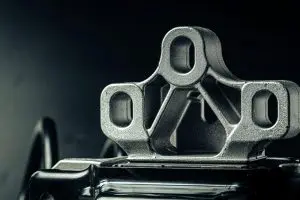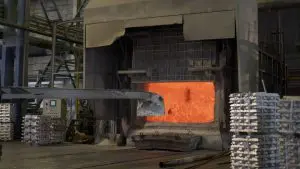How hot does metal get in die casting? It all depends on the type of metal or its alloy type you use and how carefully you adhere to die casting processes. But in general, die casting metal temperatures can range from around 600 degrees Celsius to over 1,200 degrees Celsius. Why does temperature matter? Because die casting is all about working with metal at high temperatures. If the metal is too cold, it won’t flow properly, and you’ll end up with an inferior product. Too hot, and the metal will start to break down, weakening the final product. Here’s a closer look at why temperature is so important in die casting.
Table of Contents
The Relationship Between Temperature and Die Casting
Temperature plays a crucial role in die casting for several reasons. First, as we mentioned, the molten metal must be at the right temperature to flow properly. If the metal is too cold, it will be thick and viscous, making it difficult to fill the mold cavity completely. This can result in an incomplete or porous casting. Conversely, if the metal is too hot, it will be thinner and more fluid, making it difficult to control. This can result in a casting that is too thin or has surface defects. In either case, the final product will be inferior. Another reason temperature is so important in die casting is because it affects the properties of the metal itself. For example, Aluminium becomes stronger as it gets colder, while iron becomes weaker. This means that if you want to create a strong casting, you will need to pay attention to the temperature of the metal.
The Importance of Maintaining Die Casting Temperature
Now that we’ve seen how important temperature is in die casting, it’s clear that maintaining the right temperature is crucial. But how do you do that? Here are some factors to take note of:
1. Thermal Factors
The thermal factors of die casting are the factors that affect the temperature of the metal. These include the type of metal being used, the size of the casting, and the speed at which the molten metal is poured into the mold. By understanding these thermal factors, you can control the temperature of the metal and ensure that it is at the optimal level for die casting.
2. Temperature Considerations
The mold is another important factor to consider when it comes to die casting temperature. The mold must be able to withstand high temperatures without warping or breaking. In addition, it should be made of a material that will not absorb heat from the molten metal. This will help to keep the metal at its optimal temperature, as an intact and perfectly working mold will help to prevent defects in the casting.
3. Effects of Temperature on Various Metals
So how does temperature affect the different metals used for die casting? Here are a few useful examples:
Aluminium – Aluminium is one of the most popular choices for metal die casting, as it has a low melting point and is easy to cast. However, Aluminium is also very sensitive to temperature changes. If the metal is too cold, it will be difficult to fill the mold completely. If the metal is too hot, it will be difficult to control and could result in a casting that is too thin or has surface defects. The most popular Aluminium alloys for die casting are A360, A380, and A383.
Zinc – Zinc is another popular choice for die casting, as it also has a low melting point and is easy to cast. However, like Aluminium, Zinc is also sensitive to temperature changes. If the metal is too cold, it will be difficult to completely fill the mold, conversely if the metal is too hot, it will be challenging to control as it will be overly fluid. The most popular Zinc alloys for die casting are ZAMAK 3, ZAMAK 5, and ZAMAK 7.
EKO’s Temperature Control Die Casting Standards
Here at EKO Industries, we understand the importance of temperature in die casting. That’s why we have strict standards for temperature control in our die casting processes. We use only the highest quality materials, and our molds are designed to withstand high temperatures without warping or breaking. In addition, our molds are made of a material that will not absorb heat from the molten metal. This helps to keep the metal at its optimal temperature, ensuring that our castings are of the highest quality. If you’re looking for a die casting service provider that understands the importance of temperature control, we are the one for you. We’ll make sure your castings are of the highest quality and meet your specific needs. Contact us to find out more about our die casting services.



